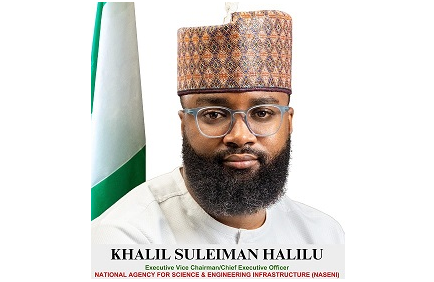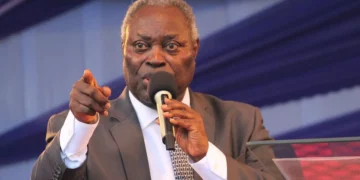In 1961, South Korea was a textbook case of despair. Per capita income sat below $100. Literacy rates hovered around 30%. Samsung was still a grocery trading company, and Hyundai was repairing fishing boats. But instead of outsourcing its future, Korea placed a bold bet—on its people, its industries, and on disciplined, deliberate execution.
Today, Samsung’s market cap exceeds $260 billion. Hyundai earned over $120 billion in revenue last year. For perspective, Nigeria’s entire 2024 federal budget is about $20 billion. The lesson here isn’t to idolize Korea—it’s to recognize what becomes possible when a nation aligns purpose with policy, and ambition with action.
At the National Agency for Science and Engineering Infrastructure (NASENI), we see Nigeria’s opportunity in similar terms. With 220 million people, a median age of just 18, and nearly four million young Nigerians entering the workforce every year, we’re not short on energy or ambition. But to turn this into prosperity, we need more than potential—we need a movement that aligns strategy with action: One that transforms “Nigeria First” from a policy into a shared national priority.
When President Bola Ahmed Tinubu signed the Nigeria First policy, it was not just a symbolic act. It was a hard reset: A new operating system for national development. It is a deliberate shift toward prioritizing Nigerian-made solutions, Nigerian innovation and Nigerian enterprise. This is not politics. This is economics—with purpose.
At NASENI, we see this not as rhetoric, but as roadmap. The data is clear: in Q3 of 2024 alone, Nigeria spent trillions of Naira on imports. A large share of that spending went toward products we have the capacity to build here—solar panels, software, machine parts, even furniture. What if we redirected even a fraction of that capital toward homegrown production? What if we bet on ourselves?
The movement we are leading is about exactly that—putting Nigeria in motion, powered by local capability. This is not about isolationism. It is about inclusion. It is about choosing to reinvest value here at home—stimulating manufacturing, deepening our tax base, strengthening the Naira, and most importantly, creating jobs. This is not theoretical. The movement is already underway.
In Katsina, our smart irrigation systems have doubled farm yields. In Ebonyi, we are testing locally built lithium batteries for off-grid communities. In Anambra and Ogun, we are working with manufacturers to remove friction using Nigerian-made technology. And just last year, NASENI launched 35 market-ready products, secured $3.25 billion in private and development capital, and trained over 5,000 local innovators.
We are not only driving innovation—we are creating a new industrial backbone, built for and by Nigerians. But no movement thrives in isolation. Government must lead, but the private sector must scale. Public procurement—estimated to be 25–30% of GDP—is a powerful lever. With Nigeria’s GDP projected to reach $1.4 trillion in 2025, this means $350–$420 billion in procurement spending. Directing even half of that to Nigerian producers could unlock over 2 million jobs each year.
This is not charity. This is smart economics. Every time a government agency chooses Nigerian-made goods—vehicles, equipment, software—they are investing in trust, signaling belief, and building the momentum of the movement. Patriotism must become more logistical than symbolic. It should live in vendor lists, procurement memos, and balance sheets.
That’s why NASENI is scaling HatchBox—our incubation platform—to support over 10,000 innovators this year. That is why we launched the NASENI Innovation Hub with AfriLabs to provide critical infrastructure for startups. And that’s why we’re working with state governments to build regional manufacturing hubs focused on energy, agriculture, and IT—creating 10,000+ direct jobs and over 30,000 indirect ones.
We are also laying the groundwork for Nigeria’s first lithium-ion battery manufacturing plant—a critical step for energy independence and electric vehicle (EV) adoption. Alongside that, we are designing templates to make it easier for MDAs to source Nigerian technologies, targeting a 25% increase in local content for public procurement.
All of this is part of a broader movement—one that says: we do not need to wait to be developed. We can build. But to do this at scale, we need coordination. Agencies must align. Budgets must serve solutions, not just systems. And policies must speak to each other—because when that happens, we go faster, together.
Let us be clear: this movement isn’t about resisting globalization. It is about shaping it from a place of strength. It is about building a Nigeria that does not just consume value—but creates it: One that earns respect not because of our size but what we build and how we solve problems.
We are not chasing miracles. We are compounding progress. This is what “Nigeria First” looks like—not as a slogan, but as a daily practice. One procurement decision, one innovation, one young entrepreneur at a time because our Samsung moment won’t come from imitation. It will come from commitment—to our people, our producers, and our collective power to build.
– Khalil Suleiman Halilu, Executive Vice Chairman and Chief Executive Officer, National Agency for Science and Engineering Infrastructure (NASENI) sent this piece from Abuja





